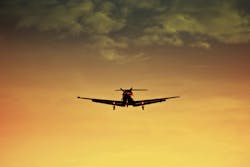German Aerospace Center tests support systems for single- and two-pilot cockpits
COLOGNE, Germany -In an extensive test campaign, researchers at the German Aerospace Center (Deutsches Zentrum für Luft- und Raumfahrt; DLR) have investigated two new concepts aimed at reducing the workload for pilots in one- and two-person cockpits: the Virtual Co-Pilot and the Remote Co-Pilot. They also evaluated the feasibility of Single Pilot Operations (SiPO) – flights with only one pilot on board instead of the current two. Together with 14 pilots – both captains and first officers on short and long-haul flights from European airlines – the researchers tested the concepts as part of the DLR project NICo (Next Generation Intelligent Cockpit). The new concepts were simulated in various realistic and demanding situations using DLR's cockpit simulator AVES (Air Vehicle Simulator), the German Aerospace Center reports. Continue reading original article.
The Military & Aerospace Electronics take:
30 June 2025 -"The study with commercial pilots demonstrates the great potential that the Virtual Co-Pilot and Remote Co-Pilot already have for reducing the workload of today's air crews," explains Christian Niermann, project lead at the DLR Institute of Flight Guidance.
Modern pilots increasingly rely on electronic flight bags (EFBs), tablet-based systems that replace traditional paper manuals. As part of the NICo project, researchers developed a new EFB app that helps pilots select alternative airports during in-flight disruptions. In simulator tests, pilots found the app highly useful, with most reporting it helped them make faster decisions.
Separately, the Remote Co-Pilot (RCP) project explored ground-based pilot support for single-pilot operations. Commercial pilots tested scenarios where one acted as a remote co-pilot for up to eight aircraft. Results showed the workstation was intuitive, and pilots could provide effective support. Both systems show strong promise for enhancing cockpit decision-making and enabling future single-pilot operations with remote assistance.
Related: A swarm of sensors, rovers and astronauts explore the 'Moon'
Related: German Aerospace Center opens UAS geo-zone for testing
Jamie Whitney, Senior Editor
Military + Aerospace Electronics
